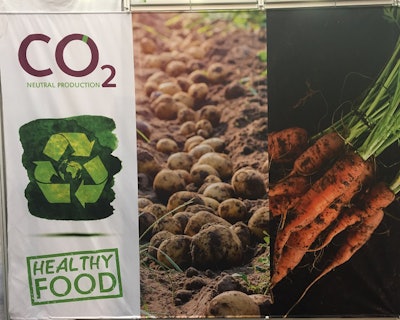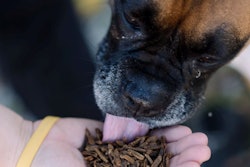
From comparisons of the carbon footprint of pet food protein sources to compostable bags, packaging label claims, alternative processing methods and research and fundraising efforts, pet food sustainability was a hot topic at Interzoo 2018, held May 8-11 in Nuremberg, Germany.
As one example of sustainability related claims, a new “gentle baked” line from Sunday Pets of New Zealand touted these terms on its bags: “Minimally processed. Pristine waters. Sustainable fishing. Farm to bag: ethical & sustainable, fully traceable.” In other words, hitting on all the pet food trends most often in the news these days, including sustainability.
Case studies and research projects focus on sustainability
Other examples of the focus on sustainability at the world’s largest pet trade show included a case study presented by Josera, a pet food manufacturer based in Germany, and Protix, a supplier of insect protein based in the Netherlands, comparing the carbon footprint of Josera’s lamb and rice dog food to one it produced using Protix’s insect protein. According to the study, the Insect Dog product has a carbon footprint (including agricultural production and transport from farm to Josera’s plant) of only 18 percent of the lamb diet.
Tarique Arsiwalla, founder of Protix, said that when the company started several years ago, its main selling point to the pet food market was the nutritional benefits of insect protein, but now it’s definitely sustainability.
Josera and Protix were among several European companies that recently joined the Pet Industry Sustainability Coalition (PISC), a US-based organization formed to help companies in the pet industry measure and improve the sustainability of their products, processes and businesses. Pets International magazine, based in the Netherlands, launched a fundraising effort during Interzoo to help establish the European chapter of PISC.
The organizer of Interzoo, WZF, also announced an initiative and research study to gauge how well pet companies understand and use sustainability concepts and practices. Working with the Sustainable Transformation Lab of the Antwerp School of Management, which conducted the study, the initiative aims to eventually create a manual for pet companies to use to improve their sustainability.
Toward more sustainable pet food processing, packaging
Besides the new baked line from Sunday Pets, other examples of pet food formats outside of traditional extruded or retort processing seemed to abound at Interzoo. That was especially the case with cold-pressed dog foods. This production method has been used, mainly in Europe, for some time, but this year seemed to herald an increase in the number of companies using it — and talking about it. (A Netherlands-based company, Farm Food HE, even handed out a 56-page booklet about its products.)*
While the companies using cold-pressed technology mostly tout the nutritional benefits, in that the lower cooking temperature — a maximum of 75 degrees Celsius — compared to that used during extrusion allows for better preservation of many nutrients in their natural state, some also claim the method is more sustainable because it requires less energy consumption. Danube Petfoods, a brand-new company from Serbia that launched its Kudo dog food line at Interzoo, said that in addition to the lower cooking temperature used, the process requires no drying of the food.
Note that these cold-pressed products are all dog foods; according to executives at Danube, cat food is much more difficult to produce using this technology because of the higher fat levels required by cats, which affects the shelf life and stability of the food. (Nonetheless, Danube is working to develop a cold-pressed cat food.)
While pet food companies also promoted their sustainable packaging, one packaging supplier, Foxpak Flexibles of Ireland, upped the game by introducing compostable pet food and treat bags. The company’s website says the material (not yet identified) will also be suitable for coffee, cereal and dried fruit.
Sustainable (or not?) pet food ingredients
Many other pet food claims centered around the sustainability of ingredients used, based on their proximity to the manufacturers or how they were grown or produced. Of course, some ingredients are inherently more sustainable than others. For example, a treat company from Hong Kong and China, Natruse, introduced at Interzoo (and, previously, at Global Pet Expo) a line of dog treats, Bamb Bones, that include bamboo shoots native to those countries.
The most novel pet food ingredient spotted, however, was camel protein, offered in a wet dog food from German company Fleisheslust. The name in English is Meatlove. While the sustainability of a European company using camel protein is debatable, this company is obviously all about the meat.
*Note: The location of Farm Foods has been corrected since this post was first published.



















